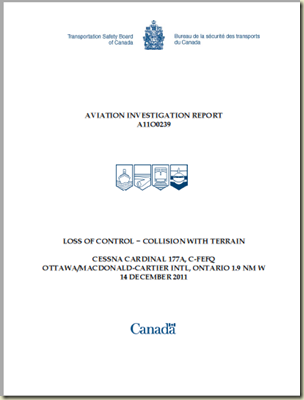
It is sad that we lost two local pilots in late 2011 to an Instrument Landing System approach to Runway 07 at CYOW. We feel sorry for their families’ loss. To read the TSB’s accident report check:
http://www.tsb.gc.ca/eng/rapports-reports/aviation/2011/a11o0239/a11o0239.pdf
The TSB put a lot of blame on the pilots for making the decision to fly in bad weather, we pilots call it “get-home-itis”. Poor judgement was clearly a big part of the problem in this accident. Nonetheless I wonder how one keeps their instrument rating when they seem to make major errors flying an ILS on most of their IFR flight tests? If flying an ILS, generally considered the safest instrument approach, leads to major errors how would this pilot have done flying a non-precision NDB approach?
Questions going through my mind after reading the TSB accident report include:
- What role does flight training play in these kinds of accidents? Does the TSB consider flight training as a factor in any accident? Was it a factor here? It seems the pilot was weak on the basics of flying on instruments.
- What role does the IFR flight test play? If rated a pass 1.6 months earlier shouldn’t one still be current? Should a pilot be issued an Instrument rating if unable to fly an ILS without major errors in performance?
- What equipment was available to the pilot? Was there an autopilot, if so was it used? What type of instruments were available, e.g. HSI, geo-referenced GPS moving map, etc.?
- What coordination did the pilot and his pilot passenger establish before flying together? Did the non-flying pilot perform any duties, call outs, etc.? Should coordination be a topic for times when two pilots are flying together? Did the owners of the aircraft establish some form of Standard Operating Procedures?
- Should one need to fly in actual Instrument Meteorological Conditions (IMC) to get an IFR rating? Do simulators and hoods really make safe IFR pilots? At least during training should pilots log some time in IMC before taking the test?
- Would re-writing the INRAT exam in November really made any difference? What is the point of the TSB raising the question?
- Was the lack of currency at night a major factor?
- Perhaps the TSB does not need to examine these questions for a single accident, but it seems simplistic to ignore systemic influences in this accident.
Just for clarity, I am not an instrument rated nor am I flight instructor and therefore write with little authority on this topic.

